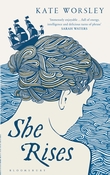 Published by Bloomsbury 14 March 2013
Published by Bloomsbury 14 March 2013
432pp, hardback, £12.99
Reviewed by Elsbeth Lindner
What’s in a title? Quite an amount in the case of Kate Worsley’s debut, a historical novel pungent with odours of land and sea, set partly in Harwich, partly on an unsavoury ship of the English navy in the mid-eighteenth century. The shanty What Shall We Do With the Drunken Sailor? hums quietly in the background, with its refrain of ‘Up she rises’, and there’s a goodly amount of singing in the alternate chapters devoted to young Luke Fletcher’s perilous experiences at sea, having been ‘pressed’ into service on the Essex, sailing south, along with a motley crew of farmers, drinkers and other stragglers beaten and dragged aboard. ‘She Rises’ also has a lewd connotation amongst the seafarers, a jostling, rowdy, terrifying and terrified crew whose disciplinary whippings at the hands of the marines on board are no more violent than the threats and aggression below decks.
Young Luke is far from equipped for this life of bravado and challenge yet when forced to face his ultimate terror – climbing the ropes and working high aloft on the sails – he discovers something wildly unexpected: an adrenaline rush, a freedom and exhilaration that alter his life.
However it’s to Luke’s sister Louise that Worsley’s title most truly refers. A dairymaid in the Essex countryside, blessed with sensitivity and attention to detail, Louise is snatched away from the raw drudgery suffered by her mother, to work in Harwich in the rather more comfortable home of Captain Handley. There she is to be lady’s maid to second daughter Rebecca, about to make a good marriage to Henry Wilmington, a gentleman And so Louise rises socially, to a post for which she is ill-equipped but where her willing nature and adaptability introduce her to something utterly new: sexual passion.
She Rises is a seductive tale of seductions. Luke’s passion for the sea and Louise’s for Rebecca will eventually fuse in a plot twist brought about with admirable confidence for a first novel. Moreover, Worsley revels – occasionally too heartily – in the period language and atmosphere of the era, creating memorable vignettes of rural poverty, small town society and tribal life aboard ship. The options for women, and the wild possibility of flouting them, lie at the heart of this enjoyably full-throated tale which ends not so much with a happy ending as with wistfulness, the taste of salt and the sound of the tide.
